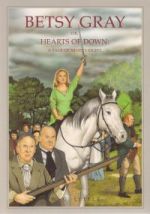Betsy Gray
 Betsy Gray — the legendary heroine of story, poem and ballad — is said to have been the daughter of Hans Gray, a prosperous north Down Presbyterian farmer and a United Irishman. Betsy was, W. G. Lyttle tells us, a striking young woman 'possessed of wondrous beauty, a beauty enriched and enhanced by a warm heart, an ardent temperament and lady-like accomplishments. Her beauty and goodness formed a theme lor every tongue wherever she went, and many a wealthy suitor sought her hand in marriage'.
Betsy Gray — the legendary heroine of story, poem and ballad — is said to have been the daughter of Hans Gray, a prosperous north Down Presbyterian farmer and a United Irishman. Betsy was, W. G. Lyttle tells us, a striking young woman 'possessed of wondrous beauty, a beauty enriched and enhanced by a warm heart, an ardent temperament and lady-like accomplishments. Her beauty and goodness formed a theme lor every tongue wherever she went, and many a wealthy suitor sought her hand in marriage'.
This classic novel transports us to those troubled and stirring days of 1798 when Betsy joined her brother George and fiance Willie Boal in the 'Turn oot' as the United Irish rebellion is called in the Ulster-Scots communities of eastern Ulster. Dressed in a green silk dress and brandishing a long sword, Betsy rode into the Battle of Ballynahinch on the 13th of June to face the cannon and musket fire of the King's forces, and to share the fate of her brother and lover.
Lyttle skilfully combines legend with local and social history to create an exciting and sympathetic tale of the heady days of the '98 rebellion in Down and Antrim. And not least in the story is the captivating character of Betsy Gray herself.
Wesley Greenhill Lyttle is thought to have been born near Newtownards, County Down, in 1844. He was founder and editor of the North Down Herald and Bangor Gazette, and author of a great many poems and sketches in Ulster-Scots. His humorous monologues, recited in the speech of an Ards farmer, were reproduced in his newspaper and subsequently published as Robin's Readings. Betsy Gray, his most popular work also originally appeared in serial form in his newspaper. He wrote two further novels, Sons of the Sod and Daft Eddie or the Smugglers of Strangford Lough. He died on 1 November 1896.
